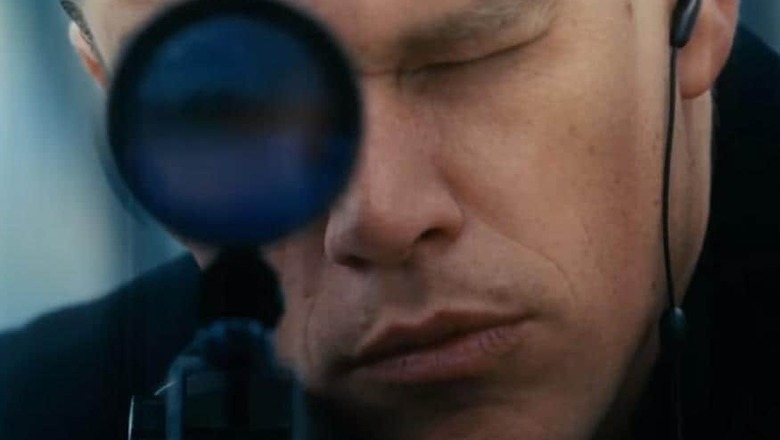
views
Hollywood is synonymous with the word formulaic; it is essentially romanticized as a well-oiled machine, an epitome of efficiency running away, blowing dirty smoke from its chimneys and producing, on a an assembly line, films. And it is much criticized for this, it has always been, by film-makers and critics alike, for compromising quality in favor of economy, for green lighting films which do not challenge any new boundaries, which do not care about the advancements and explorations which any medium must witness. Yet there are those who believe in Hollywood, who dare to think that great ideas can still see birth under the sharp eye of commercially motivated producers and production houses, who believe that rules and restrictions can always be bent if the medium so demands. Personally speaking, I’m one of these optimists who believe that Hollywood is capable of more, and I tend to follow films of the thriller/horror genres with a keen eye. Yet another year passes us by, and it is only at the end that we can have a look at how Hollywood has fared in this regard. While putting every Hollywood thriller of 2016 would make for a very lengthy list, the following marks a few anchors of what to watch, and what one can afford to miss.
1) The Sequels
Sequels are an unpleasant business, for they’re mostly a means to redeem on the name of a once brilliant entry into a stagnant genre; occasionally films tend break this trend and surprise, but 2016 hasn’t been kind.
Jason Bourne is the fifth film in the Bourne franchise, but regrettably looks halfhearted in direction and execution, surprisingly so, as it has been directed by the brilliant Paul Greengrass. The script is awkward and lazy, and the film simply apes everything that made the original trilogy so compelling, and situations and moments feel all too the same—the sniper shooting a certain protagonist in the Bourne Supremacy, a risky rendezvous in the middle of a crowded street in The Bourne Ultimatum, and so on—leading to not just a metaphorical rehash, but also a pretty literal one, as situations practically repeat themselves. Verdict- Watch the original Bourne Trilogy if you haven’t.
The Purge: Election Year is the third installment of the Purge series, a grotesque, dystopian idea that started with a home invasion film and quickly became something more, a critique of excessive lifestyles and class differences, topped off with a creepy government conspiracy. While the series has always provided bizarre visuals and a nerve wracking perspective into the fragility of human relationships and the need to survive, the third film regrettably falls into a more conventional Hollywood structure, and it is predictable and at times, unbelievable and dull. Still a must watch for the fans of the series, though. Verdict- The Purge and The Purge: Anarchy could be interesting watches if you aren’t familiar with the outlandish concept of murder being legal for one night.
The Mechanic: Resurrection is everything that the original film wasn’t. It’s happy to add a love interest, a damsel in distress, and let the petty scriptwriting work with that, shoving it in the traditional man saves woman drivel. In stark contrast, the original film, The Mechanic, was a refreshing, interesting take on an assassin and his quirks, and while it did stay a traditional Hollywood film, it had its moments, along with a nuanced treatment rarely seen in thrillers. Verdict- The original The Mechanic is a refreshing take on the lone assassin genre. Also check out The Accountant, which puts a good structure on an otherwise typical shoot ‘em up fare.
2) The Biopics
Snowden is the highlight of the year, signaling a master’s return to his medium, as much as it is wonderous to see Oliver Stone use the tools of the contemporary film-maker, the film lacks the once so poignant masterstrokes that made him a powerhouse of political commentary. The film becomes too personal, investing so much with Edward Snowden and what he felt during his journey, that it trivializes his actions and his whistleblowing, that incredible act of exposure; it trivializes what it means to lose one’s privacy, to be watched and eavesdropped upon. Surveys have concluded that the general consensus did not care much about Snowden, or the government’s breach of personal space, for that matter—and while Stone has the tendency to bring things back, refresh an important issue that may well have been forgotten, Snowden simply does not have the raw power to compare with something like JFK. No, it is simply another biopic, well made, portraying a fascinating journey, but stays a film and nothing more. Verdict- Watch it if you follow the director’s work.
Imperium is another biopic worth noting, and deals with an idealistic agent, played by Daniel Radcliffe, who goes undercover in order to infiltrate a white supremacist group which is rumored to be plotting an act of terror. With acts of racism and hate on the rise, Imperium becomes a very important, rather well timed film if only to analyze the workings of a racial definition of national identity. Imperium chooses to be ambitious in its detailing, its noticing of the small, small things that contribute to a white nationalist movement, and it is a chilling almanac of intolerant, hateful radicalism, and analyses where it is birthed, and how normal men, everyday men can sink to their lowest by believing in this ideal. Imperium is a worthy successor to the incredible American History X, and deserves its own space on the shelf. What works for this film is how casually it portrays violence and hate—the story of the agent is a true story, and he, along with a thinking audience, seem to be the only ones who can connect, and be moved by what he witnesses. Verdict- Must watch. Also watch American History X if you haven’t.
Anthropoid is a historical thriller, dealing with the infamous Operation Anthropoid, tells the story of two Czech soldiers who infiltrate their occupied homeland to assassinate Adolf Hitler’s third in command, Reinhard Heydrich, otherwise known as the Butcher of Prague. The film does not rise about conventional means, but does become a fascinating documentary of the events that occurred in Prague that started with and led to a history of violence in the city. While the film has incredible performances and stark, claustrophobic visuals, it does stretch a little too long—and saying this is unfair when one puts themselves in the shoes of the people of Czechoslovakia and the Nazi occupation which they endured—but as a simple critique to the film, it does get a tad dramatic, carried away by the usual Hollywood flow. Otherwise, it is a testament to loss, tragedy, and exceptional circumstances which resulted in what we call history, a grim reminder of the Holocaust and what an act of sheer unforgivable inhumanity it was. Verdict- If you enjoy historical thrillers, this one will probably satisfy. Also, check out The Debt (2010), as astounding film with a very similar premise; one could even call it an adaptation.
3) The Science Fiction thrillers
10 Cloverfield Lane is a hybrid, a lovechild of a sci-fi invasion film and a dystopian bunker thriller. Unfortunately it does neither very well, and for a claustrophobic bunker experience one would be much better off watching Xaviers Gens’s The Divide (2011). However, the premise of the film is fascinating, and it plays very well with the idea of the outside world when one hasn’t seen it (popularly known as the mystery box), when everything outside is based on stories, rumors, and one man’s opinion. It has all the elements a good thriller would need, that nasty little seed of doubt which makes one rethink everything one is being presented, but in the end, when it comes down to it, it chooses special effects over content, and can’t really be quoted as a worthy successor to J.J Abram’s Cloverfield, which it is an offshoot of. Verdict- Check out The Divide for an unforgiving bunker film that charts humanity’s descent into madness.
A pleasant surprise from the bland sci-fi fare is Arrival, a film that unexpectedly breaches first contact through the eyes of a professor of linguistics. The film is more about deciphering an alien language and what it implies, and makes a certain commentary about how fractured we are as a human race. The lens through which the alien race is presented is refreshing after ten years of Hollywood studio invasion and breaking bridges and toppling towers—here is a story from the brilliant mind of Denis Villeneuve that transcends time and space in a fashion reminiscent of Interstellar, only with a plot that seems more personal and detailed, where you cannot see another actor as the lead. A special note about the music score—it is transcendental, and must be heard in speakers worthy enough. Verdict- A must watch. Also check out Villeneuve’s other works—Enemy, Prisoners, and Sicario, if you haven’t.
4) The Vanguard
This category is dedicated to two films which pushed the envelope, which felt so anti-Hollywood in their presentation and agenda that they’re welcome as a fresh breath of air in an otherwise stagnant lineup. If one reads up on the directors, it’s interesting to note that they were short film makers who were given a chance, a shot, a creating something greater, which accounts for the stark difference in quality.
Lights Out is a horror film by David Sandberg, based on his viral horror short of the same name. The concept of the film is really, really, simple. What if a creature—a monster, if you will—can exist only in the dark, and ceases to exist if the lights are on? The film has the lucidity of a light switch, which is far more than a metaphor here. There are only two positions a light switch can have—on and off—and the film uses this idea to toy with its audience. The budget is barebones, there are four actors, relatively unknown, but with a tight narrative, convincing performances, and smart special effects, Lights Out becomes an edge of the seat experience in horror, keeping very much in touch with its indie roots, yet having the pacing to beat the attention span an audience might have in a feature length film. Extraordinary well-crafted and told with a naked lack of pretense, this could be an excellent example of where horror needs to go next, now that one has seen most of the jump scares and cheap thrills which Hollywood horror mostly has to give. This film supplies a creeping sense of dread that builds steadily and rewards the audience often with scares, so often that one wonders if the film’s going to run out. But of course, the film doesn’t. Verdict- Watch it alone, with the sound all the way up, and the lights, but of course, off.
Don’t Breathe is directed by Fede Alvarez, whose debut Evil Dead, as a reboot, marked a new player in the horror game. His second film has a fascinating premise—three young robbers break into the house of a blind war veteran, only to find the tables turn. Without saying more here, the film is a visceral, unforgiving experience in horror, a film that stays within the confines of a house and manages to trap the audience with it, a film that will leave one dreading every single turn. The sound design is jarring, deliberately crafted because one of the characters is blind, and the narrative, while simple, has a few dark twists that will disgust and repulse and awe one with shock and horror. This is a film school bible equivalent of crafting horror, a statement that horror needs not supernatural monsters and spirits and wraiths when one can simply deal with the depravity of human beings; it is a study in build ups and using sound and camera movements to dictate how the audience is travelling with the protagonists, where the film-maker has complete and utter control over when one will gasp out loud, hold one’s breath, or simply listen, listen hard in the darkness for that one sound which might mean so much.
Verdict- Watch this. Also watch Evil Dead (2013) if you haven’t. Also watch Wait Until Dark, a classic with a similar premise.
These films have something in common—outstanding visualizations with a very limited premise and an unenviable budget, which truly makes one wonder if the best ideas do indeed happen under the most restrictions. Regardless, these two films are more than good experiences—they stand as beacons, as forerunners to more promising films to come, a sign that Hollywood is taking chances, that it is fanning the flame of an alternative, different cinema that does not rest on its conveyor belt. The masters of thrillers in Hollywood created certain rules and treatment, and the audiences—who the films were always meant for—always look for successors, not just to enforce those rules, but also break them when required, and polish out something more than just another film, change with the times, evolve with the medium. Though 2016 has seen more than it’s fair share of the formulaic, the films which have pierced through have created a lacuna to be filled, and hopefully pave a way for new, interesting cinema, especially in a genre which begs to be taken more seriously. Onward to 2017!

















Comments
0 comment